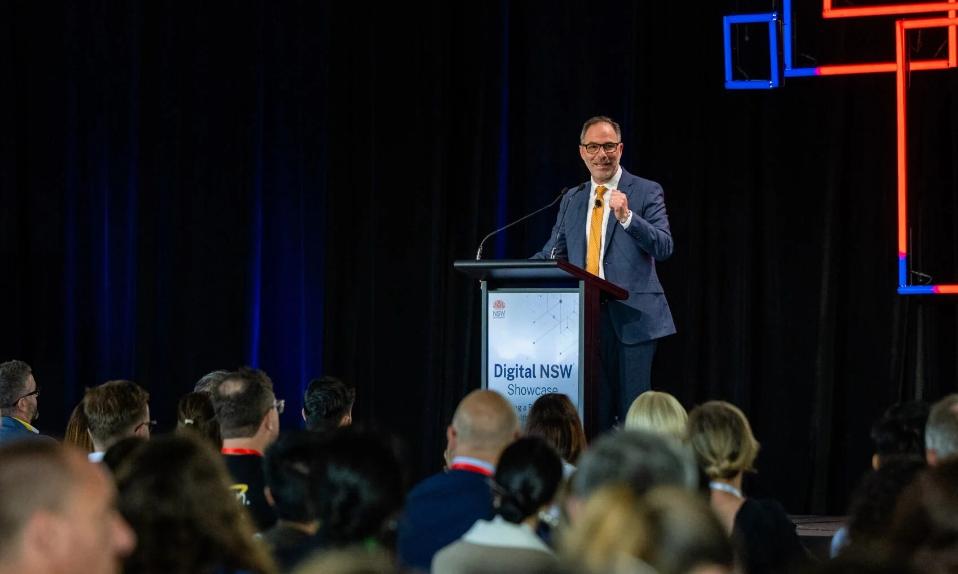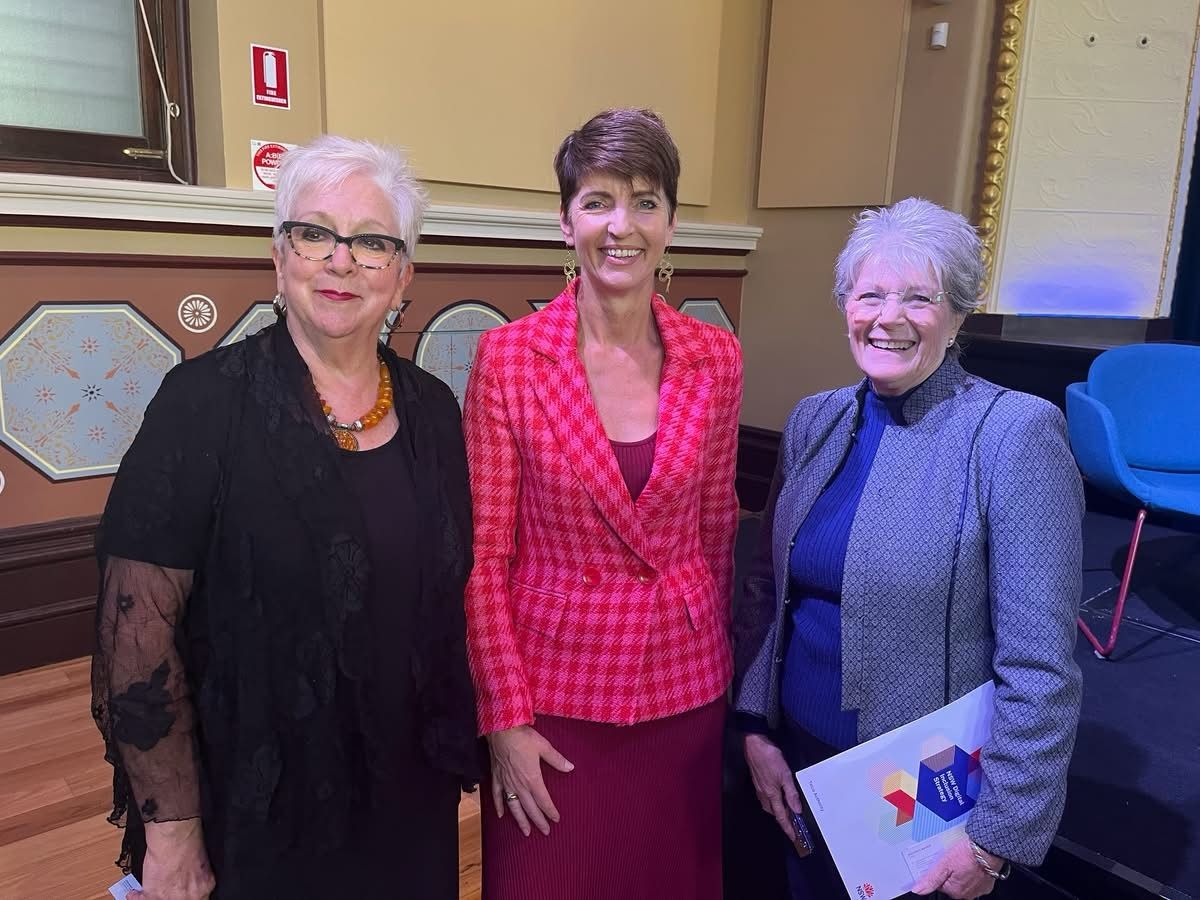NSW Government's Digital Inclusion Strategy Launched + NSW ID support bill Introduced

On Thursday May 1 2025 the NSW Government launched its first Digital Inclusion Strategy, setting a clear path to close the digital divide and ensure everyone in NSW can access and benefit from the digital world.
The strategy was previewed at a special event last week at Parramatta Town Hall, attended by NSW Minister for Customer Service and Digital Government, the Hon. Jihad Dib, who delivered a keynote address highlighting the importance of digital inclusion in creating a more connected and equitable NSW.
The event brought together leaders from across government, industry and community organisations to hear more about the strategy’s vision, its pillars and practical initiatives. VIP guests included NSW Minister for Families, Communities and Disability Services, Kate Washington, NSW Women's Safety Commissioner, Dr Hannah Tonkin, Member for Parramatta, Donna Davis and Member for Liverpool, Charishma Kaliyanda.
On May 8 a device bank repurposing government laptops and more support to protect vulnerable people from cyber risks were announced as two key initiatives to be delivered through the Government’s first Digital Inclusion Strategy.
The Minns Labor Government states its strategy aims to bridge the digital divide for people living in NSW by addressing challenges faced by vulnerable and disadvantaged communities when engaging online.
The new strategy will support the digital economy and people in NSW who are struggling to afford or access the internet or who lack the skills or confidence to interact online safely, and launches a series of transformative initiatives.
The all-of-government approach is built around five pillars – digital ability, affordability, accessibility, connectivity, and trust and safety – helping people to gain the access, tools and confidence to thrive in a modern digital world, while maintaining offline options for essential services.
Vulnerable groups who can least afford to be targeted are at significant risk, whether they are retirees or low-income earners.
Consultation on the strategy revealed more than 80 per cent of respondents had experienced online scams, privacy breaches or harassment, with at-risk groups disproportionally affected. This includes Aboriginal and Torres Strait Islander people, those who are culturally and linguistically diverse, people in the LGBTIQ+ community and people living with disability.
As part of the strategy, ID Support NSW will build on their work to assist vulnerable communities through workshops and tools to help people protect themselves from hackers and scammers, strengthen password security, spot a scam or safeguard against digital threats.
To provide more equitable access to digital services, the NSW Government will work with industry to pilot a NSW Device Bank to refurbish government laptops for disadvantaged families and individuals to connect, learn, work and access vital information. Each year, the NSW Government retires around 2,300 laptops, which can be given a new lease on life.
A key deliverable under the NSW Digital Strategy, the NSW Digital Inclusion Strategy will also help drive broader economic benefits including improved access to education, employment and healthcare.
The digital inclusion strategy builds on research and consultation with the public, community organisations, government agencies and the technology sector. More than 1,630 submissions were received, highlighting barriers to digital inclusion.
Findings show more than one in five people (22 per cent) feel they lack skills for using the internet for everyday tasks, with older people and people living in public housing the most affected.
The NSW Digital Inclusion Strategy and its Action Plan are now live and available to explore. The strategy sets a clear direction for government agencies, community partners and industry to work together to improve access, skills, affordability and safety in the digital space.
The NSW Digital Inclusion Strategy has been developed by the NSW Telco Authority and can be viewed on the NSW Digital Inclusion Strategy webpage.
Find out more about the NSW Digital Strategy.
Minister for Customer Service and Digital Government Jihad Dib said:
“The NSW Digital Inclusion Strategy is about giving people a fair go in the digital world and helping to bridge the digital divide.
“Whether you’re in social housing, a remote community, living with disability or struggling with the cost of staying connected, we are looking at ways Government can help and make life easier for communities.
“Through these initiatives we can make a real difference for those who most need support. As the first strategy of its kind in NSW it gives us a great launchpad to work with industry, not-for-profits and our communities to all play a role in lifting digital access.
“We know prioritising digital inclusion isn’t just the right thing to do, it’s the smart thing to do. By making strides to close the digital divide in NSW, we can help boost productivity and our economy through increased education, jobs and opportunities for people to reach their full potential.”
Minister for Disability Inclusion Kate Washington said:
“The pandemic and recent disasters have shown us digital access isn’t a luxury, it’s a lifeline. It’s how we work, learn, connect with loved ones, access healthcare and stay informed during emergencies.
“When people are excluded from digital spaces, they’re excluded from essential parts of modern life. That’s why the NSW Digital Inclusion Strategy is so important.
“By listening to people with disability, carers and advocates, this Strategy takes an important step toward a more inclusive NSW—helping more people access digital services, stay connected, and participate safely and confidently in everyday life.”
Chair of the Australian Digital Inclusion Alliance David Spriggs said:
“The launch of the NSW Digital Inclusion Strategy marks a critical step forward in closing the digital divide across the state. In today’s world, digital participation is not a luxury - it is essential for accessing education, employment, healthcare, community services, and government support.
“Digital inclusion is about more than just access to technology. It is about empowering people to fully participate in society and the economy. The NSW Digital Inclusion Strategy provides a clear roadmap for building a digitally capable, connected, and resilient community. We look forward to supporting the NSW Government to implement the strategy and making digital inclusion a reality for all.”
NSW Telco Authority Managing Director Kylie De Courteney said:
“We understand how critical connectivity is, whether it’s supporting emergency services and communities in remote areas, or helping families stay online during challenging times. We’re committed to working with our partners to deliver this strategy and provide practical solutions that make a real difference in people’s lives.”
COTA New South Wales said:
''We are pleased to see our advocacy around digital inclusion for older people reflected in the first NSW Digital Inclusion Strategy. We welcome the commitment to provide digital government services to all together with the recognition of the need to continue to provide non-digital services for those who still need them.
We also welcome the inclusion of digital inclusion guidelines for government public consultation and the commitment to implement systems that ensure older people in NSW have the right support to become digitally included and safe online.''

Minister for Disability Inclusion Kate Washington and two attendees to the launch of the Digital Inclusion Strategy
Further highlights from the strategy include:
- Developing a partnership program with the private sector to address connectivity challenges in underserved areas across NSW, building on existing programs to improve mobile and broadband access in regional and remote areas.
- Promoting multilingual cybersecurity training and online safety advice to help culturally and linguistically diverse (CALD) communities protect themselves from scams, privacy breaches and data theft.
- Investing $3 million through the Digital Restart Fund to modernise Multicultural NSW’s translation and interpreting services, streamlining access to 50,000 annual language service requests to help diverse communities access essential services.
- Developing a NSW Government policy on best practice management and use of temporary digital connectivity solutions in response to network failures and natural disasters, including the deployment of broadband Cells on Wheels and Portable Connectivity Units (PCUs).
- Exploring a government data donation model for unused mobile data for communities and collaborating with Commonwealth, private and non-profit sectors to reduce prohibitive connectivity costs for those facing financial hardship.
- Developing a NSW Digital Inclusion Standard to guide NSW Government agencies in designing products and services that are inclusive and easier to use, and embed accessibility best practices across procurement, consultation and service design.